Jump to: Three ways to improve your immunity | Weight loss | Lower blood sugar levels | Increase vitamin D levels | Take home message
We’ve previously written an article on eating for immunity, highlighting how adding more vitamin C (peppers, broccoli, citrus fruits), garlic, and ginger can positively affect our immune health and reduce the severity of the common cold.
Alongside many factors like nutrition, vaccination, and sleep; obesity, type 2 diabetes, and vitamin D all influence our immune system in various ways:
In obesity, you’re more at risk of developing enlarged fat cells that release certain chemicals. These chemicals are beneficial in moderate amounts but unhealthy in excess.
In type-2 diabetes, the high levels of sugar in the bloodstream seem to have the same effect that obesity does on our immune cells, as well as preventing the ‘Pacman-like’ function of the immune response, known as phagocytosis, from working properly.
Vitamin D appears to play a role in supporting our immune system and boosting the activity of our antibodies.
In obesity, it seems that our enlarged fat cells ‘pull’ vitamin D from the bloodstream, and it becomes ‘trapped’, making it difficult for the body to access the vitamin D it needs.
From these observations, we can then identify three crucial areas to focus on that may support our immune system function well in the long term:
- Weight loss. When we lose excess body fat, our fat cells shrink and become more functional. They stop secreting excess proteins called cytokines that can negatively impact our immune cells.
- Lower blood sugar levels. Suppose we can reduce the amount of sugar in our bloodstream. In that case, we can reduce the amount of potentially harmful chemicals secreted by the body and allow phagocytosis to return to normal function.
- Increase vitamin D levels. If we can mobilise the vitamin D already stored within our fat cells and increase the amount we’re producing or eating in our diet, this could help our body’s immune function.
At Second Nature, we like to provide practical solutions to complex problems. On Second Nature, you’re supported by registered dietitians or nutritionists who use lifestyle and behaviour change to improve your overall health and immunity.
If you struggle with regular illness and infections or want to improve your health for the long term, click here to join over 150,000 people who’ve joined Second Nature.
Medication-assisted weight loss with a future focus
Start with Mounjaro, transition to habit-based health with our support

1) Weight loss
Weight loss improves our immune system in three crucial ways:
- Shrinks fat cells: This lowers inflammation and insulin resistance in the body.
- Improves leptin resistance: This helps the hormone leptin communicate better with immune cells to improve their function.
- Mobilises vitamin D: Vitamin D is stored within our fat cells, and when we burn through our fat stores to lose weight, vitamin D is mobilised into the bloodstream and made available to the body.
The best way to lose weight
Any diet has the potential to support weight loss; the trick to weight loss is following a way of eating that you can sustain in the long term and maintain your lower, healthier weight.
Research suggests that diets that don’t restrict fat and are lower in carbohydrates compared to the standard low-fat diet may support better weight loss and help people sustain it in the long term.
This was demonstrated by a study comparing a low-fat, low-carbohydrate, and Mediterranean diet (which is naturally higher in fat from olive oil, pork, and fish) and found that after two years, people following a low-fat diet lost an average of 3.3kg.
Comparatively, those following a Mediterranean diet lost 4.6kg and low-carbohydrate 5.5kg.
Interestingly, a recent study showed that restricting dietary fat to less than 30% of total energy during weight loss changed dopamine signalling in the brain. This encouraged the consumption of ultra-processed foods rich in refined carbohydrates, added fat, and sugar.
This impact on dopamine may explain some results in randomised controlled trials that suggest diets lower in fat are challenging to adhere to for many people.
A study looked at the impact of a low-fat and Mediterranean diet on weight loss and other markers of disease risk. Interestingly, the study also analysed how well people adhered to their diets.
They found those on the Mediterranean diet could meet their minimum target of eating at least 35% of their calories from fat and ate more, averaging around 40%.
In contrast, those on a low-fat diet struggled to adhere to their target of eating less than 30% of their calories from fat, averaging 32%.
This suggests that strict low-fat diets may be difficult to maintain in the long term. Fat is more energy-dense than carbohydrates, but its biological effects on the body may help you eat less overall.
Click here for an NHS-trusted meal plan.
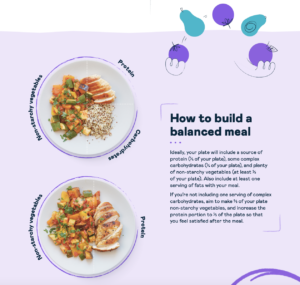
Key points:
- Weight loss improves immunity by shrinking fat cells, lowering inflammation, and mobilising vitamin D.
- Weight loss can be achieved through any diet, but it’s important to follow a way of eating that you can sustain.
- Human intervention trials suggest that diets higher in fat can support more weight loss and might be more sustainable than low-fat diets.
- Recent research also suggests that restricting fat to less than 30% of calories during weight loss can trigger an increased desire to consume ultra-processed foods.
2) Lower blood sugar levels
Lowering blood sugar (glucose) levels can improve your immune system by:
- Lowering inflammation.
- Improving leptin resistance.
- Increasing the Pacman-like activity of immune cells called phagocytosis.
While stress, exercise, and improved sleep can help manage blood sugar levels, improving your diet is the first step many should take.
Recent research suggests that lower-carb diets based on whole foods are more effective at lowering blood sugar levels than standard low-fat diets.
A meta-analysis (a study comparing lots of studies) investigated the effects of eight different dietary patterns on blood sugar levels based on human clinical trials.
It showed that the three most effective diets for lowering blood sugar levels were those that were lower in carbohydrates and higher in fat from whole foods. These were low-carb, Mediterranean, and the Paleo diet.
Interestingly, the low-fat diet was ranked eighth out of the eight diets reviewed for blood sugar improvements.
Similarly, another meta-analysis found that individuals following a lower-carbohydrate diet are 35% more likely to achieve diabetes remission after six months than individuals following a low-fat diet.
Click here for five recipes to lower your blood sugar levels.
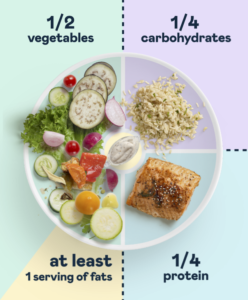
Key points:
- Lowering blood sugar levels improves immunity by lowering inflammation, improving leptin resistance, and increasing phagocytosis (the process of our immune system that destroys viruses).
- There’s good evidence suggesting that diets lower in carbohydrates and based on whole foods, such as the Mediterranean diet or Second Nature’s guidelines, are more effective at lowering blood sugar levels than low-fat diets.
3) Increase vitamin D levels
Increasing your vitamin D levels will enable the vitamin to interact with our immune cells (such as white blood cells) and keep them functioning correctly to fight off pathogens. There are three ways we can do this:
- Increase the amount of vitamin D we make.
- Increase vitamin D intake in our diet.
- Mobilise existing vitamin D from fat stores.
1. Sun exposure
Our body can make vitamin D via sun exposure on the skin. In some countries, like the UK, we can only get enough vitamin D from the sun between April and September, when the sun is high enough in the sky, and the UV rays are more potent.
How much vitamin D our body will produce is measured by the minimal erythemal dose or MED, which is the threshold used that may induce sunburn.
If our skin is exposed to one measure of MED, or when our skin turns a mild pink, our body produces between 10,000 – 25,000 IU of vitamin D.
Research has shown that doing this at least three times a week is enough to maintain healthy vitamin D levels in your blood and store excess in your adipose tissue for later use.
How quickly it takes your skin to reach the threshold of one MED will depend on many factors, such as your skin tone, your location, the month of the year (the higher the sun is in the sky, the stronger its effects), and whether you have any pre-existing health conditions.
For some people, this might be 10-minutes, particularly if your skin is very fair, or it could be around 25-30 minutes if you’re used to regular sun exposure or have a darker skin tone.
Should we be concerned about too much sun exposure?
We should always be concerned about getting sunburnt. If we plan to spend an extended time in the sun (e.g. on holiday), we should always use sun cream.
However, the common misconception is that any sun exposure is bad – particularly when it comes to the more dangerous type of skin cancer (also known as malignant melanoma).
Surprisingly, recent scientific research shows that moderate sun exposure reduces the risk of malignant melanoma.
Additionally, sun exposure has also been shown to have multiple health benefits. Such as reducing your risk of heart disease, lowering blood pressure, contracting infectious diseases, improving mood and sleep, and having an anti-inflammatory effect.
So, ideally, we should aim for regular (daily) exposure to the sun for 10-30 minutes, depending on our skin tone, location, and the time of year. Most crucially, though, we should always avoid reaching the point where we get burnt.
2) Supplementation & dietary sources
During the winter months in the UK, the sun is too low in the sky, and the UVB rays are too weak to support the production of vitamin D in the body.
Many public bodies recommend taking a daily vitamin D supplement of at least 400 IU (10 micrograms) to maintain adequate vitamin D levels. However, recent research suggests that nearer 1,000-2,000 IU is necessary to maintain healthy blood levels of vitamin D, and even 5,000 IU for those deficient.
There’s little evidence that values up to 10,000 IU are toxic, but few people need more than 4,000 IU daily. Overall, 2,000 IU appears safe and effective for the average healthy adult. If you’re pregnant or have any health conditions, we recommend discussing this with your GP first.
You can get vitamin D from a healthy balanced diet. Still, food sources of vitamin D are pretty limited, and even the foods that do contain some vitamin D don’t contain enough to adequately maintain vitamin D levels in the body.
For this reason, we must get adequate sun exposure in the summer and take an additional vitamin D supplement in the winter.
However, the following foods contain some vitamin D that can support your body to maintain adequate levels alongside the above recommendations:
- Oily fish – such as salmon, sardines, herring, and mackerel
- Mushrooms (that have had extended sun exposure this will be advertised on the label)
- Red meat
- Liver
- Egg yolks
- Some fortified foods, such as milk alternatives and whole grain cereals (check labels)
3) Mobilising vitamin D
In obesity, vitamin D may become trapped within the fat cells, blocking the body’s ability to mobilise vitamin D into the bloodstream to support our immune system. Research also suggests vitamin D is pulled into adipose tissue to help grow and maintain our fat cells.
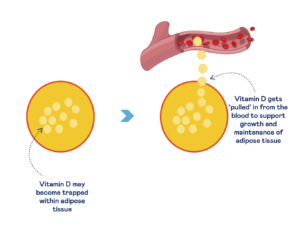
Research has shown that weight loss and exercise can mobilise our adipose tissue’s existing vitamin D stores.
Weight loss
We know that when we lose body fat during weight loss, our body ‘burns’ through and mobilises our fat stores. Research has found that this can also help to ‘free’ the vitamin D stored in our fat cells for the body to use.
A study on women found that weight loss increased circulating vitamin D levels. It also showed that the greater the weight loss, the more significant the increase in circulating vitamin D, with the individuals achieving the most weight loss also seeing the most significant increase in circulating vitamin D.
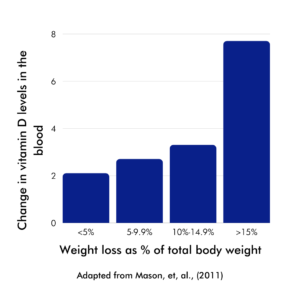
A healthy diet based on whole foods rich in protein, fibre, healthy fat, and complex carbohydrates is the best way to lose weight. Click here for an NHS-trusted meal plan.
A fibre-rich diet and probiotic foods like kimchi may also improve gut health, which has a potential immune-boosting role.
Exercise
Along with weight loss, exercise and physical activity have also been shown to mobilise our body’s fat cells and allow our body to burn through our stored fat to provide energy during the activity.
Research has shown that a single 30-minute aerobic exercise (such as cycling) at moderate intensity can increase circulating vitamin D levels by around 10% for 24 hours. This effect was maintained throughout 5-weeks when exercise was performed three times a week for 30-minutes.
Both weight loss and exercise appear to increase vitamin D levels in the body by freeing the fat cells and mobilising them for energy. Vitamin D is released during this process, almost acting like a passenger along for the ride.
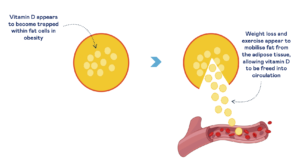
Beyond vitamin D
Other essential vitamins can also boost immunity, such as vitamin A, which is found in sweet potatoes and red meat; vitamin E, which you can find in cold-pressed rapeseed oil, nuts, and seeds; and selenium, which you can find in Brazil nuts.
Vitamins C and E are also potent antioxidants which help to support your body’s immune response.
Key points:
- There are many ways to increase your body’s levels of vitamin D.
- This can be achieved by increasing our intake, through supplementation or dietary sources, or your body’s production through non-burning sun exposure during summer months.
- We can also free up existing vitamin D stores within the body’s fat cells through weight loss or exercising regularly.
Take home message
A healthy immune system requires a holistic approach. It can’t be optimised through quick-fix solutions or popping a few supplements.
By slowly building a healthy lifestyle and focusing on the foundations of what’s supporting your immune system, you can specifically target areas of your lifestyle that will lead to improvements in the long term.
Losing weight (and maintaining a healthy weight), lowering blood sugar levels, and ensuring adequate vitamin D levels are three evidence-based ways to ensure that your immune system is functioning to optimise your health.
Other lifestyle changes, such as getting enough sleep, good hydration, practicing mindfulness, and reducing stress levels, will also boost immunity.


